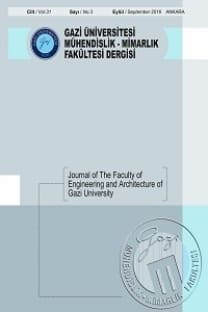Farklı akışkanlarda değişken soğutucu akışkan debili (vrf) sistemin ekserji ve termoekonomik analizlerinin karşılaştırılması
Günümüzde birçok ısıtma ve soğutma sistemi bulunmaktadır. Değişken soğutucu akışkan debili (VRF)iklimlendirme sistemi de bunlardan biridir. Bu sistemler hem soğutma sistemi hem de ısı pompası olarakkullanılabilmektedir. Bu özelliği sayesinde aynı anda farklı hava şartları gereken otel, okul ve hastane gibibinalarda kullanımı öne çıkmaktadır. Ayrıca, aynı anda hem ısıtma hem de soğutma yapabilmesi enerjitasarrufu açısından da katkı sağlamaktadır. Bu sistemlerin diğer bir önemli avantajı ise, tek bir dış ünite ile birden fazla iç ünitenin çalışabilmesidir. Bu çalışmada, değişken soğutucu akışkan debili (VRF)iklimlendirme sisteminin farklı çalışma koşullarında, debilerde ve soğutucu akışkanlarda gerçekleşen entropioluşumları ve ekserji kayıpları hesaplanmıştır. Bu kayıplar neticesinde gerçekleşen ekserji verimleri tespitedilmiştir. Ayrıca, ekserji analizi sonrası sistemin termoekonomik analizi ve ekserji dikkate alınarak maliyethesabı yapılmıştır. Yapılan çalışma ile VRF sistemlerinin en verimli çalışma koşulları ve en az ekserji kaybını sağlayan soğutucu akışkanlar belirlenmiştir. Çalışma koşulları ve soğutucu akışkanlar dikkatealındığında sistemin ekserji eksenli maliyeti hesaplanmıştır. Yapılan analiz neticesinde, VRF sistemlerinineş zamanlı ısıtma ve soğutma yaptığı durumun en verimli çalışma koşulu olduğu izah edilmiştir. Ayrıcasoğutucu akışkanın ve soğutucu akışkan debisinin ekserji verimi ve ekserji eksenli maliyete etkisi ortayakonmuştur.
Comparison of exergy and thermoeconomic analysis for variable refrigerant flow (vrf) system with different rerigerants
Nowadays lots of heating and cooling systems are available. Variable Refrigerant Flow System is one ofthese systems. These systems can be used both as a cooling system and a heat pump. Due to said functionally,these systems distinguish in the buildings which need different air conditions in the same time like hotels, schools or hospitals. Furthermore, with the capability of heating and cooling at the same time, these systemscontribute to energy conservation. Another important advantage of these systems is that with one outsideunit, more than one inside unit can be work. In this study, exergy losses and entropy generations of variablerefrigerant flow (VRF) system has been evaluted in different working condition, mass flow rates andrefrigerants. Exergy efficiencies that occur as a result of these losses has been determined. Besides, thermoeconomic analysis of system after the exergy analysis and cost calculation which considered exergyhave been carried out. With this study, optimum working contidions of VRF systems and refrigerants thathas provided minimum exergy losses have been determined. Cost of the system according to exergy has beenevaluated considering working conditions and refrigerants. According to analysis it is explained that, thecondition in which VRF system heating and cooling simultaneously, is the most efficient working condition.Also the effects of refrigerants and mass flow rate of refrigerant to exergy efficiency and cost of the systemaccording to exergy has been revealed.
___
- 1. Yıldırım A., Değişken Soğutucu Akışkan Debili Klima Sistemlerinde Ekserji Analizi, Yüksek Lisans Tezi, Osmaniye Korkut Ata Üniversitesi, Fen Bilimleri Enstitüsü, Osmaniye, 2014.
- 2. Aynur T.N., Hwang, Y., Radermacher R., Field Performance Measurements of a VRV AC/HP System, 11th International Refrigeration and Air Conditioning Conference, Purdue, IN - A.B.D., 1-8, 15-20 Temmuz 2006.
- 3. Aynur T.N., Hwang Y., Radermacher, R., Experimental Evaluation of the Ventilation Effect on the Performance of a VRV System in Cooling Mode - Part I: Experimental Evaluation, HVAC&R Research, 14 (4), 615-630, 2008.
- 4. Ünal Ş., Erdinç M.T., Kutlu Ç., Thermodynamic Analysis of a Refrigeration System with Double Evaporators and Ejector, Journal of the Faculty of Engineering and Architecture of Gazi University, 31 (4), 1039-1047, 2016.
- 5. Oruç V., Devecioğlu A.G., Effect on the Thermodynamic Performance Using N20 and R444B Refrigerants Instead of R22 in a Vapor Compression Refrigeration System, Journal of the Faculty of Engineering and Architecture of Gazi University, 31 (4), 859-869, 2016.
- 6. Eyriboğun M., Isı Geri Kazanımlı Değişken Akışkan Debili (VRV/VRF) Klima Sisteminin Termodinamiği ve Akış Kontrolü, Ulusal İklimlendirme Kongresi, Antalya-Türkiye, 283-299, 18-20 Kasım 2011.
- 7. Taner T., Sivrioğlu M., Thermoeconomic Analysis For the Power Plants of Sugar Factories, Journal of the Faculty of Engineering and Architecture of Gazi University, 29 (2), 407-414, 2014.
- 8. Çalışkan H., Dinçer İ., Hepbaşlı A., Exergoeconomic and Sustainability Analyses of a Novel Air Cooler, Energy and Build., 55 (1), 747-756, 2012.
- 9. Kılıçarslan A., Hoşöz M., Energy and Irreversibility Analysis of a Cascade Refrigeration System for Various Refrigerant Couples, Energy Convers. Manage., 51 (12), 2947-2954, 2010.
- 10. Demir V., Günhan T., Şahin A., Ekren O., Bilgen H., Erek A., Experimental Investigation of Cooling Performance of Milk Cooling Tank with the Vapor Compressed and Solar Absorption (LiCl-H2O) Cooling System, Journal of the Faculty of Engineering and Architecture of Gazi University, 31 (1), 29-37, 2016.
- 11. Tu Q., Zou D., Deng C., Zhang J., Hou L., Yang M., Nong G., Feng Y., Investigation on Output Capacity Control Strategy of Variable Refrigerant Flow Air Conditioning Systems, Appl. Therm. Eng., 99 (1), 280- 290, 2016.
- 12. Padilla M., Exergy Analysis of The Performance of a Variable Refrigerant Flow (VRF) Air Conditioning System, International Journal of Air-Conditioning and Refrigeration, 19 (1), 57-68, 2011.
- 13. Kabul A., Alkan R., Farklı Soğutucu Akışkanlar için Toprak Kaynaklı Isı Pompasının Termodinamik ve Termoekonomik Analizi, Isı Bilimi ve Tekniği Dergisi, 36 (1), 119-131, 2013.
- 14. Çengel A.Y., Boles M.A., Thermodynamics: An Engineering Approach, Mc-Graw Hill, New York, A.B.D., 2002.
- 15. Yıldız A., Thermoeconomic Analysis of Diffusion Absorption Refrigeration Systems, Appl. Therm. Eng., 99 (1), 23-31, 2016.
- ISSN: 1300-1884
- Yayın Aralığı: Yılda 4 Sayı
- Başlangıç: 1986
- Yayıncı: Oğuzhan YILMAZ
Sayıdaki Diğer Makaleler
Güneş altında kurutulmuş havuç dilimlerinin rehidrasyon kinetiğinin incelenmesi
TÜRKÇE İÇİN ARDIŞIK ŞARTLI RASTGELE ALANLARLA BAĞLILIK AYRIŞTIRMA
METİN BİLGİN, Mehmet Fatih AMASYALI
Ağır metallerin giderimi için düşük maliyetli adsorban olarak pirina kullanımı
Oğuzhan GÖK, Özgül Çimen MESUTOĞLU
Mehmet Emre ÇEK, Olcay AKAY, Alirıza YAVUZ
Türkçe için ardışık şartlı rastgele alanlarla bağlılık ayrıştırma
Mehmet Fatih AMASYALI, Metin BİLGİN
YÜKSEK PLASTİSİTELİ KİLLERİN KALICI KAYMA MUKAVEMETİNE PLASTİSİTENİN ETKİSİ
